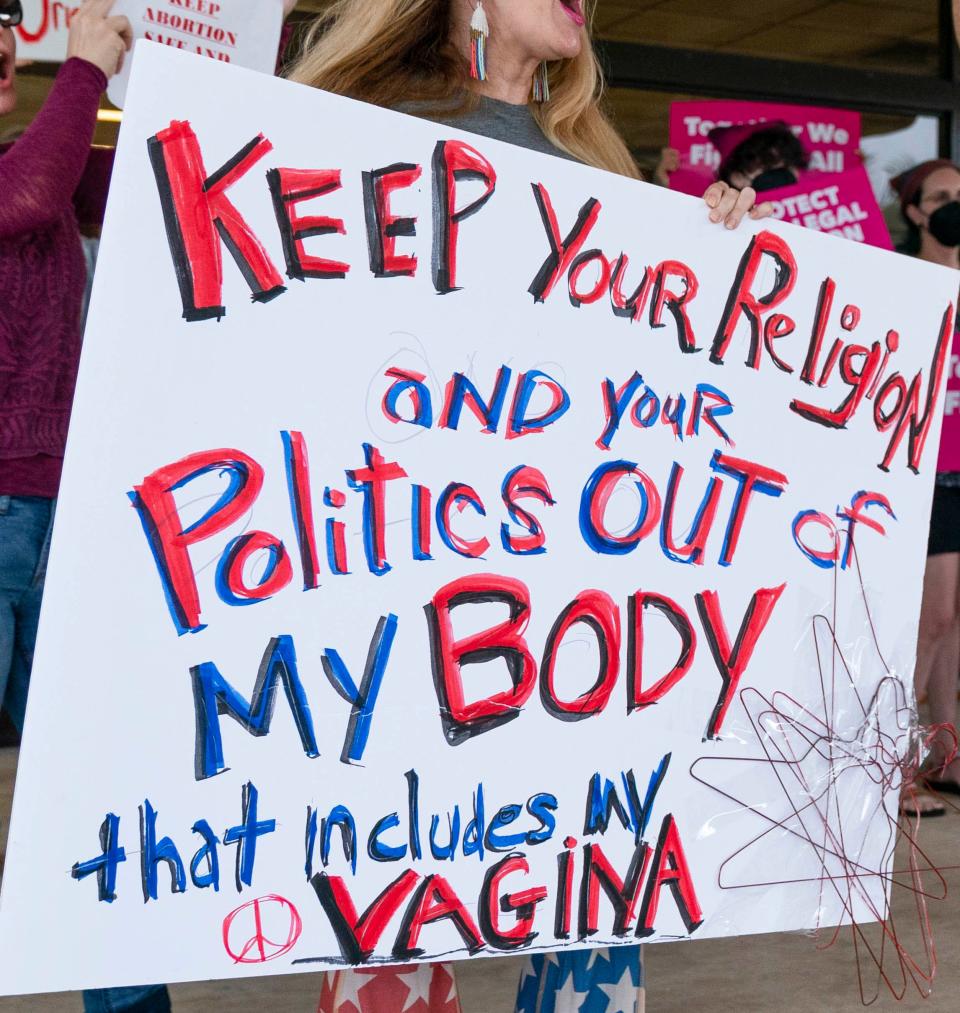Don't mess with Florida's constitution unless serious issues are involved, like abortion
- Oops!Something went wrong.Please try again later.
Sam Ervin, the folksy senator from North Carolina who headed the Senate’s Watergate committee 50 years ago, sometimes cited an adage he’d learned as a young law student: “If it is not necessary to amend the Constitution, it is necessary not to amend the Constitution.”
Stated less lawyerly, that means “Leave the Constitution alone.” Pass statutes, which can be adapted or repealed as the public wishes or as necessities change but don’t mess with the founding document of our government unless there’s a pressing need and no other way to meet it.
By Ervin’s standard, Florida needs only one of the half-dozen amendments on the general election ballot, a proposal about abortion rights.

More on reproductive rights: Tamayo: Time for Florida voters to take back their abortion rights | Opinion
The U.S. Supreme Court wiped out the 1973 Roe v. Wade precedent, which made abortion a decision between women and their doctors, and threw the issue back to the states. Florida lawmakers responded with a ban on abortion after six weeks of pregnancy but a petition initiative put a proposal before voters to decide whether to restore choice in this morally and politically volatile matter.
Since Gov. Ron DeSantis and the Republican-run Legislature have shown where they stand, it’s up to the voters. Where abortion has been on ballots since the nation’s highest court acted, voters in state after state have approved amendments similar to the Florida initiative.
The rest of the down-ballot stuff doesn’t involve personal rights and is not essential to the functioning of our government. Even the relatively harmless ones fall short of Ervin’s “necessary” standard.
Allowing recreational marijuana use for adults is an idea that’s been around since the ‘60s, at least, and a proposed Florida constitutional amendment is intended to further enrich the deep-pocketed pot merchants who bankrolled the petition effort that got it on the ballot. A bunch of states have legalized marijuana — not just for medicinal use, as Florida did a few years ago — and public attitudes toward the drug have shifted a lot.
Our view: Abortion is on the Florida ballot this election. Protect women’s right to choose.
So if proponents want to elect enough House and Senate members to do it by statute, and a governor who’ll sign such a law, that’s how to do it. There’s no great public need or benefit for chiseling into the Florida Constitution a right to get high.
The other four amendments on the ballot were put there by the Legislature, with a bit of Republican mischief.
One would make school board races partisan. Members now run non-partisan races but the proposal would lead to candidates qualifying as Democrats or Republicans.
It’s a side effect of the GOP culture wars, fitting neatly with the governor’s “war on woke” in the classroom. You can easily find out if your local school board candidates are in one party or the other, if that matters but can you name anything that’s been improved by partisan politics?
Me neither. Certainly public education — the most expensive and important thing government does — won’t benefit from partisanship.
There’s a property-tax proposal that would link one of our homestead exemptions to the rate of inflation, saving homeowners some money and perhaps making them think kindly of the Republican lawmakers who enacted it. It would also cost local governments a bundle at a time they need revenue to meet the rising cost of everything.
Another amendment would give Floridians a constitutional right to hunt and fish. Nice, but it hardly rises to the level of the Constitution.
And there’s yet another Republican attempt to repeal public financing of campaigns. The public-financing system includes a qualifying method to keep the kooks from dipping into the treasury for matching money, and candidates must abide by spending limits to get some.
Republicans call it “welfare for politicians,” and some GOP nominees reject state money, which is usually easier for them to do.
But that raises a different ethics issue. We don’t like special interests bankrolling candidates. We don’t want lobbyists basically bribing them with campaign contributions for future favors. And it’s not nice for ultra-rich candidates to buy themselves a powerful public office.

So where DO we want them to get money? It’s really not much, and public matching money is a perhaps distasteful alternative to corporate handouts to politicians.
Bill Cotterell is a retired Capitol reporter for United Press International and the Tallahassee Democrat. He can be reached at wrcott43@aol.com
This article originally appeared on Palm Beach Post: Abortion only issue worthy of consideration for a Florida amendment

